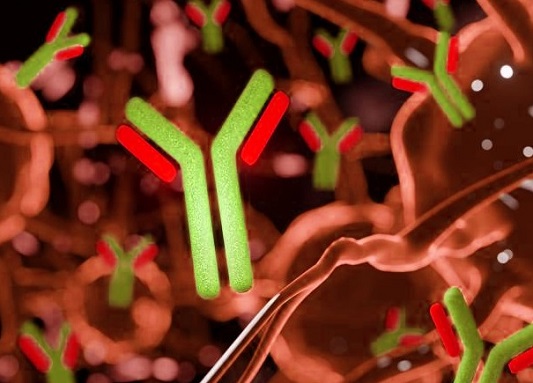COVID-19 Induces Expression of Autoantibodies Targeting Proteins Linked to Rheumatologic and Neurologic Functions
Nikhil Prasad Fact checked by:Thailand Medical News Team Jan 26, 2025 2 months, 3 weeks, 4 days, 2 hours, 27 minutes ago
Medical News: The aftermath of the COVID-19 pandemic has unveiled a puzzling condition known as long COVID, where symptoms persist long after the initial infection has resolved. Researchers worldwide are now delving deeper into the mechanisms behind this phenomenon. A recent study spearheaded by scientists from the SB RAS Institute of Chemical Biology and Fundamental Medicine and Novosibirsk State University, Russia, along with contributions from the Almazov National Medical Research Centre-Russia, is shedding new light on the interplay between long COVID and the immune system.
 COVID-19 Induces Expression of Autoantibodies Targeting Proteins Linked to Rheumatologic and Neurologic Functions
COVID-19 Induces Expression of Autoantibodies Targeting Proteins Linked to Rheumatologic and Neurologic Functions
This
Medical News report dives into the findings of their two-year investigation involving a 36-year-old male patient who experienced polyneuropathy, a condition characterized by nerve damage, following his COVID-19 infection. The study’s primary focus was to understand how SARS-CoV-2, the virus responsible for COVID-19, influences autoantibody production and immune system dysregulation.
The Patient’s Journey and Methods
The subject of the study, a man with latent autoimmune diabetes in adults (LADA), first contracted COVID-19 in late 2020. He required intensive care due to acute pulmonary insufficiency. After three weeks of hospitalization, he was discharged, but over the next six months, he reported a cascade of symptoms associated with long COVID, including fatigue, neuropathic pain, and cognitive impairments. These manifestations suggested both rheumatologic and neurologic disruptions.
Over the course of two years, the patient provided regular blood samples for analysis. Researchers utilized enzyme-linked immunosorbent assays (ELISAs) to measure antibody titers and levels of cytokines and interferons, key markers of immune activity. The findings were compared with those of 18 systemic lupus erythematosus (SLE) patients and 22 healthy donors.
The Role of Autoantibodies
One striking discovery was the increased presence of autoantibodies targeting specific proteins associated with rheumatologic and neurologic functions.
Antibodies against myelin basic protein (MBP), a crucial component of the nervous system’s protective sheath, surged during the post-COVID period. These elevated levels were strongly correlated with the patient’s ongoing neurological symptoms. Another noteworthy finding was the rise in antibodies for double-stranded DNA (dsDNA) and single-stranded DNA (ssDNA), commonly linked to autoimmune conditions like lupus.
Despite the alarming spike in these autoantibodies, the study noted a silver lining. The heightened levels of antibodies eventually subsided as the patient’s symptoms improved, indicating that the immune system’s hyperactivity could stabilize over time.
Cytokines and Interferons: Immune Markers in Focus
Cytokines, small proteins
critical in regulating the immune response, played a pivotal role in the patient’s recovery trajectory. Interleukin-6 (IL-6) and Interleukin-10 (IL-10) levels were notably elevated during the peak of long COVID symptoms, only to taper off as health improved. A similar pattern was observed with interferon-gamma (IFN-γ), which initially surged but later normalized.
Interestingly, the patient’s vaccination with Sputnik V - administered ten months post-COVID - triggered another wave of heightened immune activity. This was marked by a temporary increase in cytokine levels and a corresponding rise in antibodies targeting the virus’s spike protein. However, these changes were short-lived and did not exacerbate long-term symptoms.
Implications of the Findings
This study underscores the complex interplay between the immune system and long COVID. The temporary surge in autoantibodies and cytokines highlights how SARS-CoV-2 disrupts immunological balance. However, the gradual return of these markers to baseline suggests that the immune system can recover with time and appropriate management.
The researchers emphasized that single-time-point measurements of autoantibodies might not provide a comprehensive picture. Instead, longitudinal studies, like this one, are crucial to understanding how immune markers evolve and whether they pose risks for chronic autoimmune conditions.
Conclusions and Future Directions
The study’s findings have broad implications for both patients and clinicians. Monitoring immune markers over extended periods is essential for identifying those at risk of developing autoimmune complications post-COVID. Additionally, the research highlights the importance of personalized treatment approaches, as immune responses can vary widely among individuals.
While the patient in this study did not develop chronic autoimmune diseases, the temporary rise in autoantibodies underscores the importance of vigilance. Patients recovering from severe infections may benefit from extended follow-up care to detect and manage potential long-term complications early.
This study demonstrates that even in cases of severe immune disruption, the body’s mechanisms for restoring balance are robust. However, further research involving larger cohorts is needed to generalize these findings and uncover potential therapeutic interventions for long COVID.
The study findings were published in the peer-reviewed journal Rheumato.
https://www.mdpi.com/2674-0621/5/1/1
For the latest COVID-19 News, keep on logging to Thailand
Medical News.
Read Also:
https://www.thailandmedical.news/news/covid-19-induces-expression-of-anti-agtr1-autoantibodies-causing-endothelial-dysfunction-and-symptoms-treatable-by-losartan
https://www.thailandmedical.news/news/canadian-study-shockingly-finds-that-between-25-to-57-percent-of-covid-19-patients-develop-anti-nuclear-antibodies
https://www.thailandmedical.news/news/high-prevalence-of-autoimmune-issues-found-in-those-with-post-acute-covid-vaccination-syndrome
https://www.thailandmedical.news/news/sars-cov-2-infections-and-covid-19-vaccines-increase-risk-of-myositis-specific-and-myositis-associated-autoantibodies
https://www.thailandmedical.news/news/new-research-reveals-long-lasting-autoantibodies-in-almost-all-exposed-to-covid-19
https://www.thailandmedical.news/news/new-findings-on-plasmablasts-and-autoantibodies-in-covid-19
https://www.thailandmedical.news/articles/coronavirus
